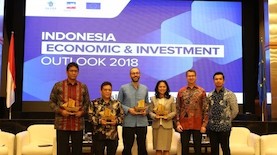Kamis, 08 Februari 2018
Indonesia Economic and Investment Outlook 2018
Indonesia Economic and Investment Outlook 2018
INDONESIA INVESTMENT AND ECONOMIC OUTLOOK 2018
The European Business Chamber of Commerce (EuroCham) in partnership with the Indonesia Investment Coordinating Board (BKPM) had successfully organised the event “Indonesia Economic and Investment Outlook 2018”, which was held in Jakarta, 8 February 2018.
The main purpose of this event was to provide information and facilitate discussion between the EuroCham members, the government and other relevant stakeholders with regards to the Indonesia economic and investment outlook. The event also highlighted the importance of human capital development for the country’s economic and investment climate improvement.
The event was opened by Mr. Ulf Backlund as the Chairman of EuroCham Indonesia, Mr. Vincent Guerend as EU Ambassador to Indonesia and Brunei Darussalam, and Ms. Farah Ratnadewi Indriani as the Deputy Chairman of Investment Climate Development BKPM.
In his opening remarks, Mr. Ulf Backlund mentioned that EuroCham members and all European companies in Indonesia were committed to develop human capital and strengthen the local capacities through the transfer of knowledge and technology. In this matter, he pointed out the importance of human capital development to sustain Indonesia’s growth, also the EU-Indonesia CEPA negotiation as the medium to strengthen the human capital development. Mr. Vincent Guerend continued by emphasizing the need for addressing market access issues and regulatory uncertainties/changes in regulations to encourage more investment. Ms. Farah Ratnadewi highlighted the position of EU as an important economic development partner of Indonesia. Investment realization from EU countries increased by 20% compared to the same period last year. Moreover, the increasing trend is also accompanied by more number of investment origin countries such as Poland and Denmark that invest in Indonesia, aside from the mainstream European countries like the Netherlands and UK.
The panel discussion session was attended by five speakers namely Mr. Leonard VH Tampubolon as Deputy Minister for Economic Affairs, National Development Planning Agency (Bappenas); Mr. Edy Putra Irawady as Dedicated Assistant to the Coordinating Minister for Economic Affairs; Mr. Purbaya Yudhi Sadewa as Special Staff to Coordinating Minister for Maritime Affairs; Mr. Massimilano Cali as Senior Economist of The World Bank; and Ms. Ratna Dewi Antarina SF Amir as Board of Directors of Indonesia Services Dialogue / Founder of HighScope Indonesia.
Some notable points discussed in this panel discussion session were the expected condition of the Indonesian economy which is still believed to experience a steady and positive growth; the Indonesian government’s commitment in accelerating the ease of business as outlined in Presidential Decree no. 91 the year 2017 to arrange the Online Single Submission system; and the functions of Working Group IV to assist the handling and settlement of cases that impede the implementation of the Economic Policy Package.
On the same occasion, Mr. Cali from the World Bank provided another view of Indonesia’s forecasted economic outlook. Although it is still promising, the growth of foreign investment in Indonesia has not been able to outperform the growth of foreign investment as its neighbouring countries such as Vietnam and Thailand. One way to increase investment is to widen the investment opportunities through a more open Negative Investment List (DNI), particularly for the foreign investors, and revise the Bilateral Investment Treaty (BIT). Furthermore, other important factors are improving the capacity of Indonesian human resources including basic academic skills, life skills, and technical skills. The advancement of Indonesia’s education system still requires a long-term process and a common understanding between the government, the community and the education sector of the required skills.
In the last session, Mr. Thomas Lembong as the Chairman of BKPM joined the discussion and addressed some of the most recent issues related to Indonesia economic development. With regards to the issue of Indonesia’s trade and investment figures which still lags behind the peer countries, Mr. Lembong expressed his optimism on the economic reform. By empowering more investment particularly on factory, it is expected that export would go up as an implication of more goods to be produced.
Concerning the upcoming electoral political year, Mr. Lembong conveyed the message that despite the social disintegration distraction due to various ethnicity, religious beliefs, race and culture issues, now it is the right time to focus on the reform efforts. The government will continue to work on resolving the issue of legal certainty as well as increasing the speed and efficiency of the bureaucracy. Mr. Lembong also mentioned that investment in human capital is the priority that needs to be focused, specifically in the expertise development through vocational, polytechnic and university training.
Mr. Lembong also stated that e-commerce and digital economy acceleration will continue to create investment opportunity in the coming years thus contribute greatly in Indonesian economic growth. In this regard, Mr. Lembong encouraged digital enterprises to report their investment to BKPM. Aside from e-commerce and digital industry, he also promoted tourism sector as well as service sector as promising investment opportunity.
Lastly, Mr. Lembong also underlined the EU’s investment which considered as a quality investment through its sophisticated technology and the proven commitment, along with its area of expertise such as infrastructure, aeroplane and renewable energy which are complementary with Indonesia’s development goals.


